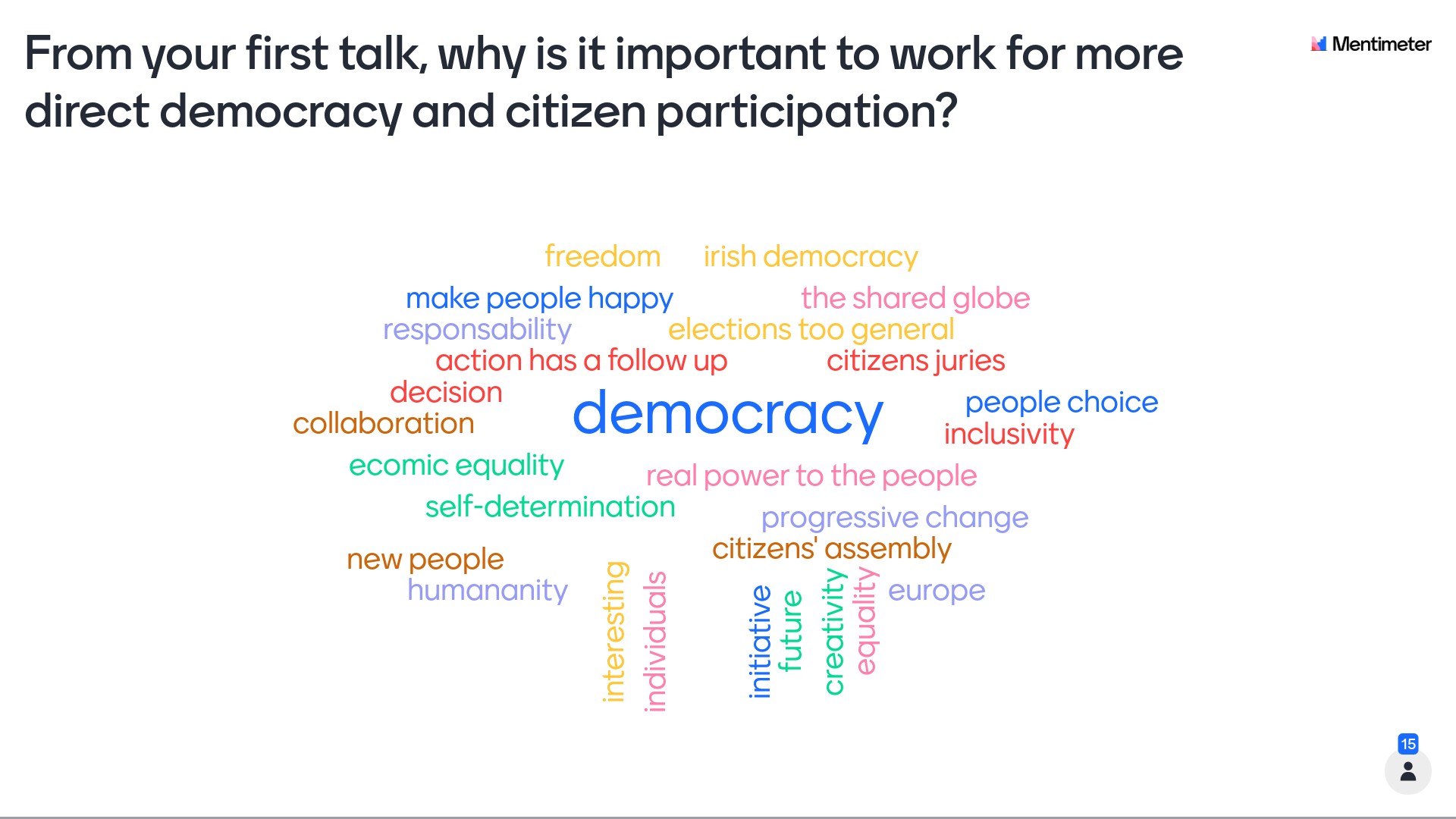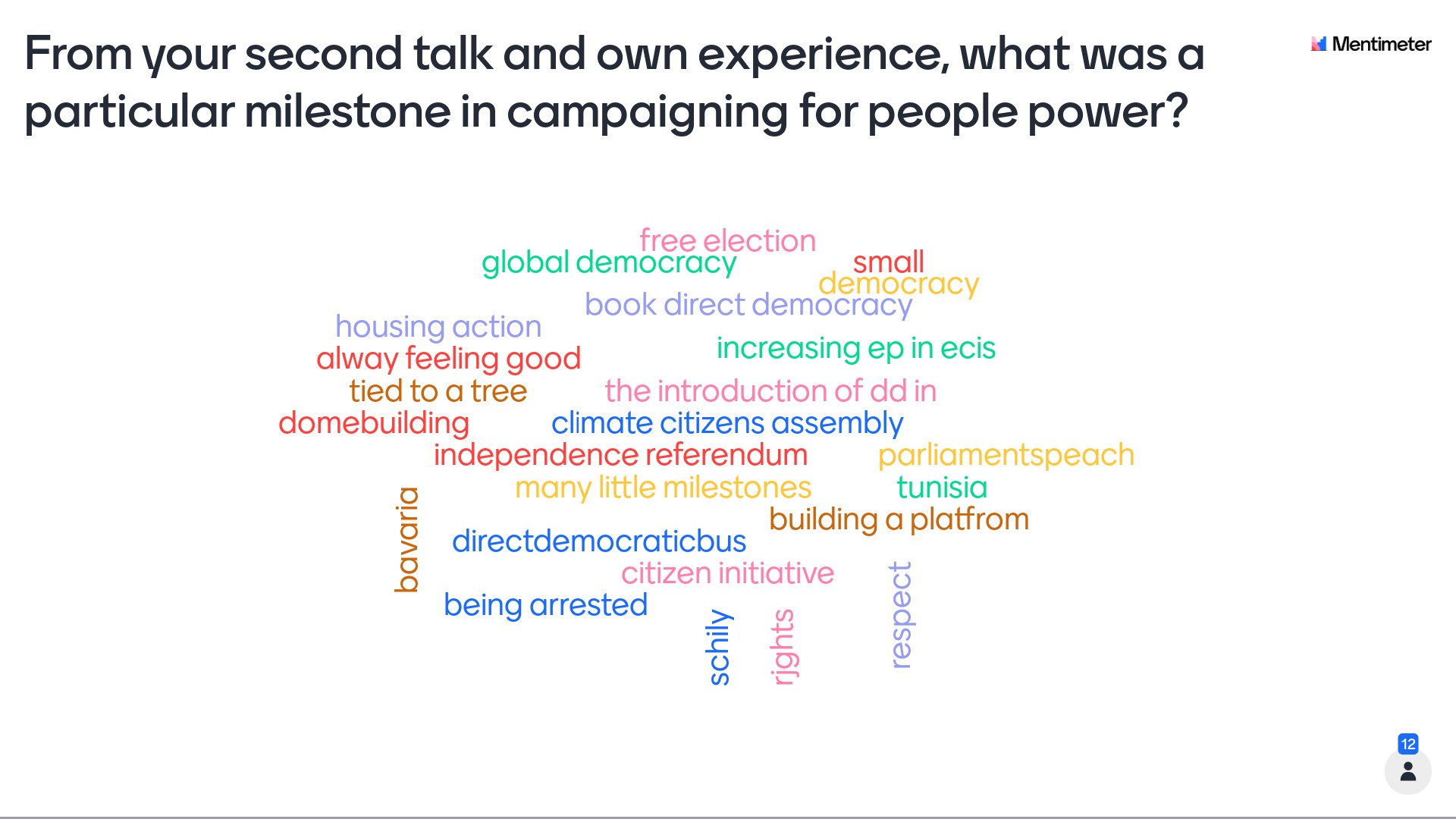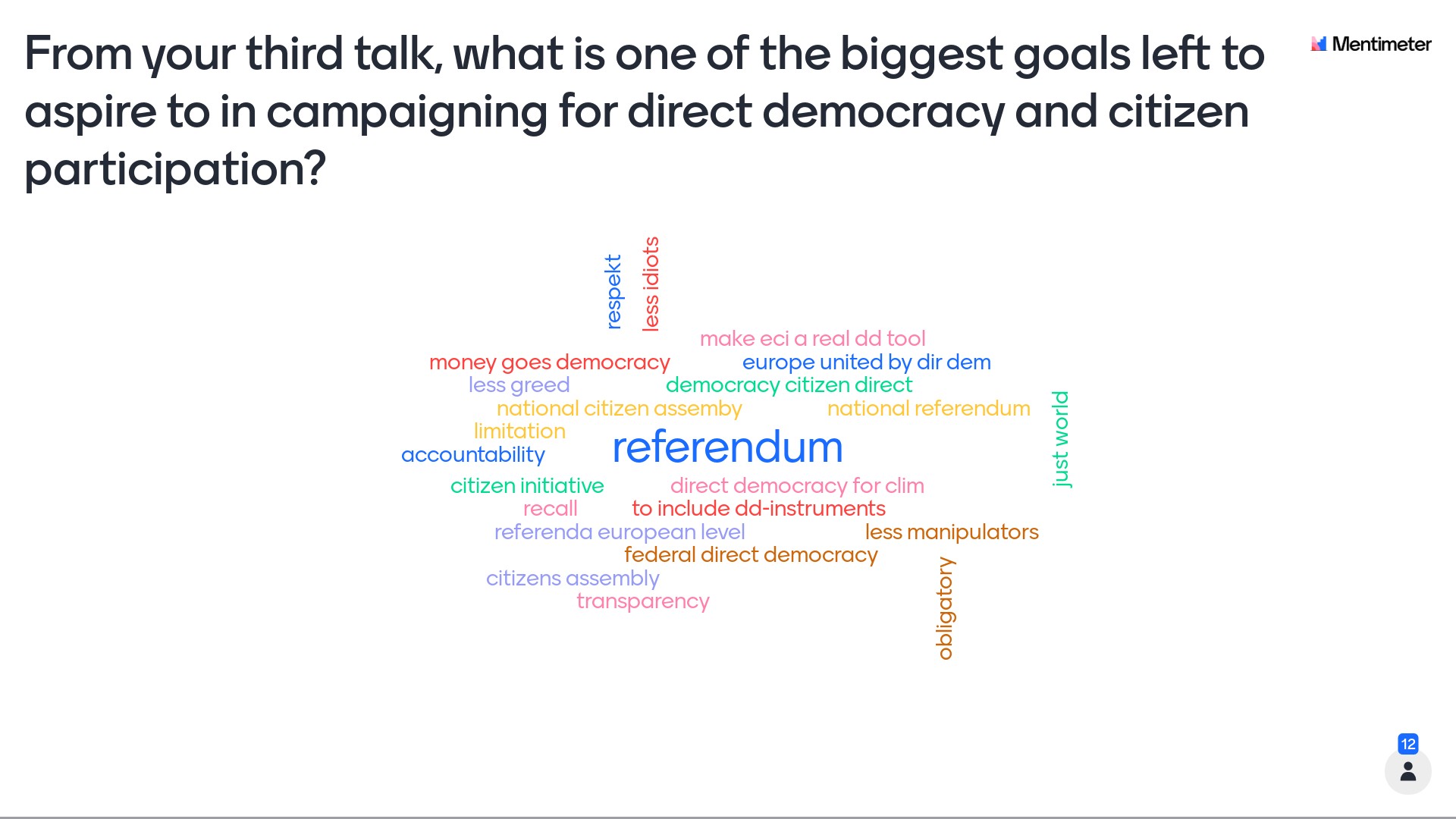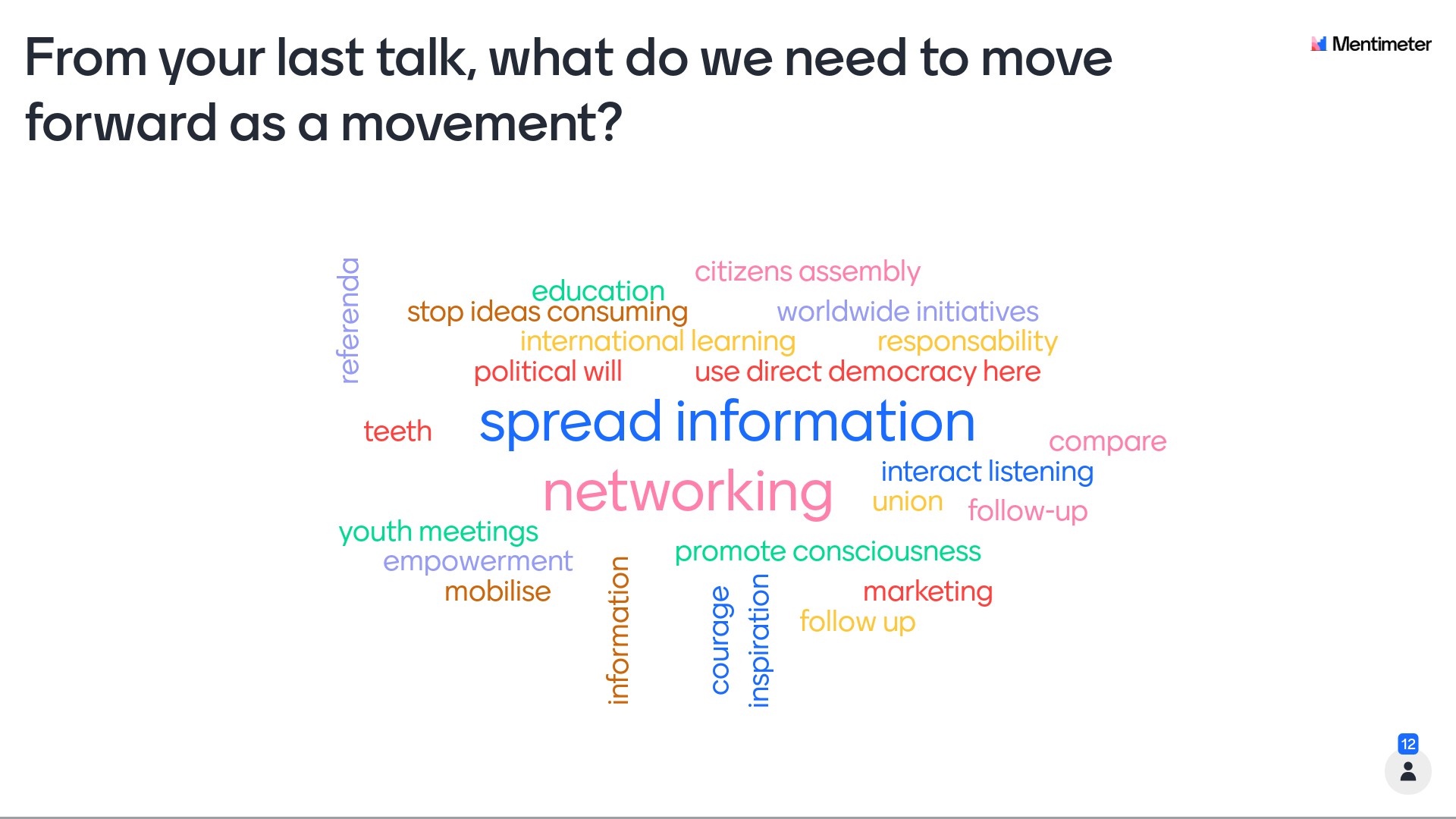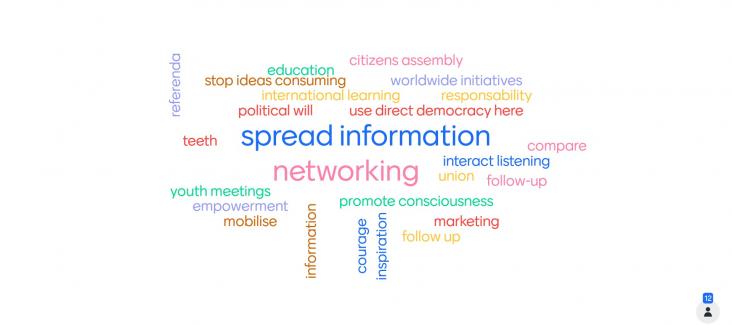The keynote was provided by Professor Matt Qvortrup of Coventry University, one of the world's leading experts on referendums, who gave participants a sneak preview of his upcoming book Democracy on Demand. "I am the the narrator of your story," he opened the session, "I'm a political scientist, but you are out there doing the work."
In his keynote, Professor Qvortrup made a stong case for true modern direct democracy. "We live in an age where we have all the information at our fingertips. We have music and movie streaming services, but democracy is stuck in the era of LPs and movie theaters." To clarify his thesis, he distinguishes between politics and policy: Politics being an adversary game, the arena where we distinguish between friend and enemy, while policy is about practical issues and which actions can be undertaken. Direct democracy then, he posits, concerns itself with policy, while solely representative democratic systems focus heavily on politics.
In Professor Qvortrup’s opinion, the key to a living, well-functioning democracy is the ability to foster discussion. “We are not what we know, but what we are willing to learn. Democracy is what we are willing to learn. We need to be willing to be corrected, to move forward. This is why democracy is vastly superior to any other system in the world,” he said, „Policy is not about winning the argument, but about solving the problem.” Finally, he pointed out that empirical data is on our side as well. Statistics show that with every referendum we get happier and richer.
In order to celebrate the diversity of direct democracy movements around the world and to venture a look at what the future might look like for different regions, we asked to hear a specific vision for the future from three Democracy International board members, Jung-Ok Lee from South-Korea, Mehdi Ben Mimoun from Tunisia and Joe Mathews from the USA.
Jung-Ok Lee, the former Minister of Gender Equality and Family of the Republic of Korea, pointed out how globally we face new challenges on the front of sustainability, feminism and migration. The only way to move forward on these issues, she said, is to become more inclusive. We need to go beyond nationalism and institute civilian control over consumption culture. Especially the Covid-19 crisis has shown the dire need to deepen democracy.
Mehdi Ben Mimoun, professor at the Institut National Agronomique de Tunisie, uttered the hope that Tunisia will not be the exception in the region, but that democratization processes will persist in the whole of Africa. For Tunisia, which is currently experiencing a political deadlock, he pointed out the need to implement the 2014 democratic constitution fully. The constitution, which was a direct consequence of the Arab Spring uprising and drafted with great citizen involvement, accords more citizen participation and allows for local referendums. However, these provisions have never been put into practice. “I hope that in the next ten years, we will see referendums on the local level in Tunisia,” he said.
Los Angeles-based journalist, Joe Mathews, who was calling in just ahead of the US Independence Day, spoke about the political narrative surrounding the US-Mexican border. The border area is always portrayed as a source of conflict, but at the same time for the people living in the border area it is a natural part of their daily lives. However, they are never involved in the decision-making surrounding the borders, the decisions that affect their daily lives so strongly are made by people in Washington who don’t necessarily understand the reality on the ground. “This is an enormous opportunity for transnational democracy,” he said “we could create a citizens’ assembly on how to govern the border area, we could involve people on both sides of the border in the decision-making.”
A recurring and hopeful theme throughout the evening was the opportunity for new forms of democracy that arises with a generational shift in politics. Jung-Ok Lee pointed out that “Most of the younger generation are more interested in policy issues, which is more closely related to direct democracy, but these instruments were not integrated into our political systems.” And so young people were absorbed into party politics, and the focus has shifted to a biological representation of youth. “But young people,” she said, “don’t want to be represented, even if it is by their peers. They want to set the agenda themselves. It has made existing politics more complex, but will ultimately make direct democracy more important.” Mehdi Ben Mimoun, mentioned that there is representation of young people in political parties and parliament in Tunisia. However, the turnout of younger generations during elections is very low. One way to link them more closely to politics would be to make politics both more local and more international in scope. Another way is to bring a new generation of leaders into decision-making.
During the final part of the evening, the focus shifted on network building and conversation. During an Activist Speed Dating session, participants had the opportunity to discuss in small groups and share their experiences with one another. In four sessions, participants shared their stories of how they got involved in democracy campaigning, which milestones they had experienced and what the challenges for the future are. You can see the results of these discussions here.
